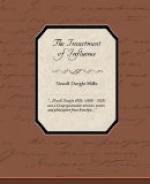Hope’s noble ministry hath grievous enemies. Among these let us include a false use of the past. Yesterday contains sins and mistakes, but multitudes err in dwelling too much upon their wrongs. Each man hath had his temptations, each his fierce conflicts and defeats, each bears grievous scars from the battle-field. Yet if one constantly revives all his old sins life will be filled with hideous specters. Memory will become a place of torment and a ghastly chamber of horrors. We shall be the children of despondency and wretchedness. Memory will be a graveyard; the past will give no light save the “will-o-the-wisp” light from putrescence and decay. All the springs of joy will be poisoned by morbid griefs that keep open old wounds. The city hath its offal heap where refuse matter is destroyed; each home its garret, the contents cast out at regular intervals; the individual throws away his old clothes, old tools, old vehicles. Why should not the soul have its refuse valley—where the past is cast out of life and memory?
Farmers’ boys sometimes set steel traps by shocks of corn whither come quail and prairie chickens. Stepping upon the traps, the cruel jaws close upon foot or wing and the bleeding bird beats out its life upon the frozen ground. Memory often with cruel jaws holds men entrapped. A single error wrecks the whole life. But once forgiven of God let the sin go. Reflection upon past sins is good only so long as it produces revulsion from sin, and like a bow shoots the soul toward God and righteousness. God is like a mother who forgives the child’s sin into everlasting forgetfulness. Man should be ashamed to remember what God forgets. “I will cast your sins into the depth of the sea.” Someone says: “God receives the soul as the sea the bather, to return it cleansed—itself unsoiled.” Gather up, therefore, all thy sins—old wrongs, old hatreds, burning angers, memories of men’s treachery; stuff them into a bag and heave them into the gulf of oblivion. Your life is not in the past, but in the future. “We are saved by hope.”
Multitudes may embitter their new year by undue reflections over opportunities neglected and lost in the past and denied in the present. Professor Agassiz tells of a friend who sold his farm in Pennsylvania for $5,000 to invest it in Dakota, and after losing all in the new home returned to find the German who purchased the homestead had found oil and great wealth in a swamp which he had tried to drain off. An old gentleman recently told of his refusal in 1840 to accept as payment of a small note a lot on a corner in Chicago now worth a million dollars, and he shed bitter tears over the loss of property he never owned. When Ali Hafed heard of the diamonds in India he sold his estate and went forth to seek his fortune. His successor, watering his camel in the garden, saw the gleam of gems in the white sand and discovered the Golconda mines. Had Ali Hafed had eyes to




